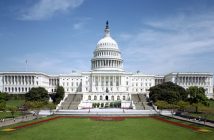Under current law, the president can react in real time to national security threats by restricting the entry of aliens under the authority laid out in Section 212(f) of the Immigration and Nationality Act. This section is quite clear, reading:
“Whenever the President finds that the entry of any aliens or of any class of aliens into the United States would be detrimental to the interests of the United States, he may by proclamation, and for such period as he shall deem necessary, suspend the entry of all aliens or any class of aliens as immigrants or nonimmigrants, or impose on the entry of aliens any restrictions he may deem to be appropriate.”
In 2017, President Donald Trump used his 212(f) authority to issue a series of targeted entry restrictions widely opposed by the Democrats. These executive orders limited the entry of foreign nationals from countries known to support or harbor terrorists.
House Democrats, particularly, criticized the targeted restrictions as Islamaphobic, pointing to then-candidate Trump’s promise to “ban Muslims” from the United States, even though the actual executive orders addressed multiple countries and did not affect anywhere close to a majority of the world’s Muslims from traveling to the United States.
House Democrats set their sights on curtailing this authority. Rep. Judy Chu (D-Calif.) introduced the NO BAN Act in April 2019. This legislation endangers national security and public safety by eliminating the ability of the president to act quickly on a determination that nationals from certain countries represented valid security threats to the country. The bill’s supporters argued that it constrains the power of the executive and gives this authority to the State Department, which must consult with Congress before issuing any type of travel ban.
Initially, House Democrats staged the vote for the NO BAN Act in March 2020, at the onset of the coronavirus health crisis in the United States. In January of this year, President Trump used his 212(f) authority to issue a proclamation temporarily suspending travel from China, where the virus originated. On the same day in March that the House debated the NO BAN Act, President Trump issued a similar temporary suspension on travel from Europe, citing the continent’s rapid growth of coronavirus cases. Late on that same day, the Democrats quietly pulled the NO BAN Act from consideration, seemingly to avoid the accusation that they were constraining the president’s ability to fight the virus.
Consider the politics at play here. House Speaker Nancy Pelosi (D-Calif.) pulled the NO BAN Act in March specifically because she did not want to seem as if the House Democrats were hindering any efforts to protect Americans from the coronavirus. Yet now in July, in the heat of the 2020 election and with the coronavirus still raging, she plans to push the NO BAN Act through Congress as a messaging bill that will die in the Republican-controlled Senate.
The House Democrats all but admitted that the existing 212(f) law was an important tool in March to stem the flow of foreign visitors – potentially infected with coronavirus – from entering the United States. On July 22, they will vote to pass a bill that, if enacted, would prevent the president from taking such quick and decisive action in the future.




